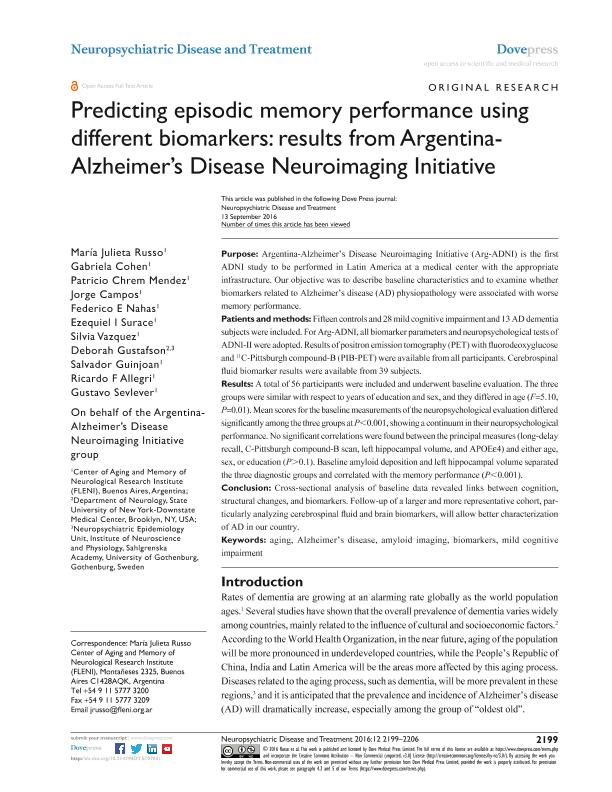Artículo
Predicting episodic memory performance using different biomarkers: Results from Argentina-Alzheimer’s disease neuroimaging initiative
Russo, María Julieta; Cohen, Gabriela; Chrem Mendez, Patricio Alexis; Campos, Jorge; Nahas, Federico Exequiel ; Surace, Ezequiel Ignacio
; Surace, Ezequiel Ignacio ; Vazquez, Silvia; Gustafson, Deborah; Guinjoan, Salvador Martín
; Vazquez, Silvia; Gustafson, Deborah; Guinjoan, Salvador Martín ; Allegri, Ricardo Francisco
; Allegri, Ricardo Francisco ; Sevlever, Gustavo
; Sevlever, Gustavo
 ; Surace, Ezequiel Ignacio
; Surace, Ezequiel Ignacio ; Vazquez, Silvia; Gustafson, Deborah; Guinjoan, Salvador Martín
; Vazquez, Silvia; Gustafson, Deborah; Guinjoan, Salvador Martín ; Allegri, Ricardo Francisco
; Allegri, Ricardo Francisco ; Sevlever, Gustavo
; Sevlever, Gustavo
Fecha de publicación:
09/2016
Editorial:
Dove Press
Revista:
Neuropsychiatric Disease and Treatment
e-ISSN:
1178-2021
Idioma:
Inglés
Tipo de recurso:
Artículo publicado
Clasificación temática:
Resumen
Purpose: Argentina-Alzheimer’s Disease Neuroimaging Initiative (Arg-ADNI) is the first ADNI study to be performed in Latin America at a medical center with the appropriate infrastructure. Our objective was to describe baseline characteristics and to examine whether biomarkers related to Alzheimer’s disease (AD) physiopathology were associated with worse memory performance. Patients and methods: Fifteen controls and 28 mild cognitive impairment and 13 AD dementia subjects were included. For Arg-ADNI, all biomarker parameters and neuropsychological tests of ADNI-II were adopted. Results of positron emission tomography (PET) with fluorodeoxyglucose and11C-Pittsburgh compound-B (PIB-PET) were available from all participants. Cerebrospinal fluid biomarker results were available from 39 subjects. Results: A total of 56 participants were included and underwent baseline evaluation. The three groups were similar with respect to years of education and sex, and they differed in age (F=5.10, P=0.01). Mean scores for the baseline measurements of the neuropsychological evaluation differed significantly among the three groups at P<0.001, showing a continuum in their neuropsychological performance. No significant correlations were found between the principal measures (long-delay recall, C-Pittsburgh compound-B scan, left hippocampal volume, and APOEε4) and either age, sex, or education (P>0.1). Baseline amyloid deposition and left hippocampal volume separated the three diagnostic groups and correlated with the memory performance (P<0.001). Conclusion: Cross-sectional analysis of baseline data revealed links between cognition, structural changes, and biomarkers. Follow-up of a larger and more representative cohort, particularly analyzing cerebrospinal fluid and brain biomarkers, will allow better characterization of AD in our country.
Archivos asociados
Licencia
Identificadores
Colecciones
Articulos(OCA HOUSSAY)
Articulos de OFICINA DE COORDINACION ADMINISTRATIVA HOUSSAY
Articulos de OFICINA DE COORDINACION ADMINISTRATIVA HOUSSAY
Citación
Russo, María Julieta; Cohen, Gabriela; Chrem Mendez, Patricio Alexis; Campos, Jorge; Nahas, Federico Exequiel; et al.; Predicting episodic memory performance using different biomarkers: Results from Argentina-Alzheimer’s disease neuroimaging initiative; Dove Press; Neuropsychiatric Disease and Treatment; 12; 9-2016; 2199-2206
Compartir
Altmétricas



